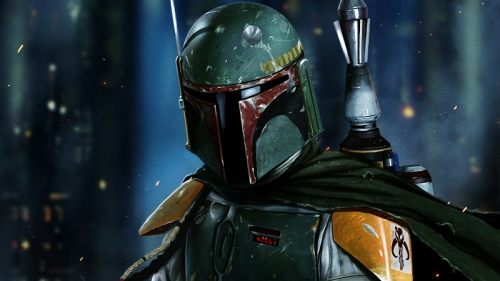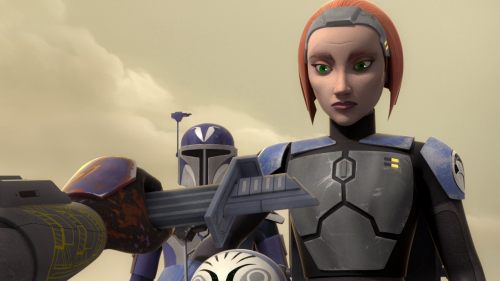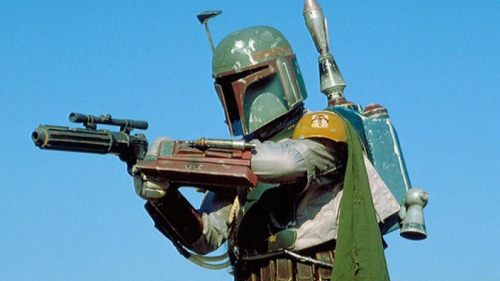The STAR WARS Fandom State of the Union
Star Wars fandom has seen many phases in its forty-plus year history. There was the wide-eyed joy of the late ‘70s and early ‘80s. The long drought from ‘83 to ‘97, in which Star Wars fans shrunk into a background populated with licensed novels of variable quality. The almost indescribable excitement leading up to the release of The Phantom Menace, and the years of disbelief at the poor films that followed. Another comparative drought, post-prequels, where animated TV ruled the franchise’s roost and Star Wars fandom subsided again, underneath a wave of superhero films.
Now, we’re in the Disney era, where Star Wars films release every year - and where fans are not only divided on the state of their beloved series, some are outright caustic. Incredibly, Star Wars’ fandom has become the title-holder for Worst Fandom Online, swiping the mantle from longtime champs “DC fans” and “gamers,” and brief contenders “Ghostbusters fans.” Congratulations?
Before I continue: obviously, we're not talking about #AllStarWarsFans here. We're talking about the most selfish, obnoxious, outspoken fans, whose values directly contradict those of the franchise they claim to represent. If you elected to read this article, you’re probably fine. Breathe. Just...breathe.
The latest development in this phenomenon, as reported this morning, is that actor Kelly Marie Tran (Rose Tico in The Last Jedi) deleted all her posts from Instagram, likely due to the volume of harassment she’d received on the platform. Instagram was Tran’s only public-facing social account, making it a magnet for toxic fans, but the abuse has spanned the whole of the Internet. Twitter is full of sexist, racist slurs about Tran, her character, and her physical appearance. Fan wiki Wookieepedia had to lock down Rose’s character page after a slew of racist defacements to it. It’s nasty out there.
Tran - an absolute delight whose excitement for Star Wars always feels genuine and infectious - had expressed discomfort with her increased public profile before, but effectively leaving a social media platform is a step familiar to anyone who's suffered similar abuse online. Fellow actor Daisy Ridley deleted her Instagram account; writer/director Rian Johnson weathered his share of abuse on Twitter; John Boyega has repeatedly made a point of striking back at racist comments. Producer Kathleen Kennedy isn’t on social media, being busy running an entertainment empire and everything, but if she was, the tone and content of fan reaction suggests she’d be subject to even greater abuse than the rest.
Ostensibly, these fans’ anger stems from disappointment over the direction of the franchise - especially centering on The Last Jedi's mystical and pacificist arc for Luke Skywalker, its depiction of macho heroics as wasteful, and its foregrounding of female characters (elements others, myself included, consider some of its greatest strengths). And look: it’s possible to have issues with The Last Jedi without being an asshole about it. I’ve had conversations with people to that very effect, generally offline. But the debate around the film escalated rapidly upon its release, to the point where it’s almost impossible to talk about it online without conjuring a horde of angry fans screaming that you’re wrong.
How did that escalation happen, then? The answer is threefold.
Firstly: the word “fan” is an abbreviation of “fanatic,” and in that context it’s easy to see how fandoms become toxic. There’s inherent obsession in being a fan that goes beyond merely enjoying big-budget space opera now and again. And while that’s predominantly harmless, the logical endpoint of fanaticism is what we’re seeing with Star Wars: feeling ownership over the material by virtue of one’s engagement with it. "Content should be created specifically to my tastes, god damn it, because I’ve invested more in this franchise than the casuals, and I matter more than they do."
These fans voices will never be satisfied by any Star Wars movie unless they themselves write it. They’ll always find something to complain about, as adults, they'll never be able to recreate the simple joy they found in Star Wars as a child. They’re grown adults now, with grown adult problems, and when Star Wars inevitably fails to dissolve those problems and recreate their childhood, they attack the movie, rather than undergo any kind of self-reflection. That mindset is present in every fandom, to one degree or another. It even cropped up in Star Wars fandom before, during the prequel era - and incredibly, the same voices that cried “George Lucas raped my childhood” fifteen years ago (and, it's worth noting, bullied Jake Lloyd out of the acting profession) are now calling for Lucas to return to right what they consider to be wrongs. But disappointment doesn’t turn into personal attacks without another key element of which we've seen too much.
That element, of course, is the racism and sexism displayed in the criticism, whether it's open or veiled. People with a tendency towards such prejudices are bound to find changing norms difficult to deal with. For them, their favourite fictional worlds - especially if they started with stories about, say, heroic men rescuing a princess then making out with her as a reward - present a comforting respite from a world where women, people of colour, and LGBT folks matter just as much as straight white men do. Seeing those worlds suddenly mirroring real-life demographics must feel like an invasion, a betrayal. Fans who, as young straight white boys, were once at the centre of the entertainment universe, are now as adults forced to share their toys with others. They aren’t having any of it - which, conveniently, fits perfectly with fans’ frequent disdain for newcomers to their fandom.
An entitled mindset and a resentment of outsiders only becomes this oppressive, though, through organisation. Social media and message boards have enabled a radicalisation of fandom, creating an us-vs-them view that isn’t conducive to discussion or growth. Loud voices - like the many YouTubers turning hatred of Lucasfilm into a cottage industry, or the ongoing social media meltdown of fan podcast Rebel Force Radio - have created an artificial crusade, in the name of “real” fans, against their supposed maltreatment. They either openly stoke the flames of prejudice or allow them to spread because it increases their follower count. And when called on their abusive bullshit, they retreat behind a facade of constructive criticism. “Oh, we aren’t allowed to dislike a movie now?” they ask, as they bully actors off the internet.
If this pattern sounds familiar, it’s because it’s exactly the same pattern that GamerGate followed a couple years ago (with elements of the anti-critic campaign in the wake of Batman V Superman), and which Trumpism followed in the political world. People get annoyed that their favourite thing is changing; they’re especially annoyed that it’s changing to accommodate new demographics; they organise abuse against vulnerable targets online; they put up a thin veneer of respectability when called out. It’s gross, unpleasant, and at this juncture, fucking tiresome. Working on a franchise that has a fandom now seems to carry the requirement of having the patience and forgiveness of a saint. That shouldn't have to be part of the job description.
Six months on from The Last Jedi, we’re at a pretty low point for Star Wars fandom. Despite the strong box office and reviews, that movie has become a lightning rod for internet assholes. The box office failure of Solo (coincidentally, the first Disney Star Wars with a male lead, and the one most painstakingly geared towards servicing existing fans) has only emboldened them further, putting Kathleen Kennedy at the centre of conspiracy theories and doubling down on their hatred. These people claim to love Star Wars, but what they really love is the romance of a childhood they can never recapture. And though they might claim to hate Kathleen Kennedy, The Last Jedi, or Rose Tico, what they really hate is themselves.
Ironically, these fans could stand to learn a few things from the movie they hate so much.
Peace, everyone.
What we talk about when we talk about manbabies
— Rian Johnson (@rianjohnson) June 5, 2018



